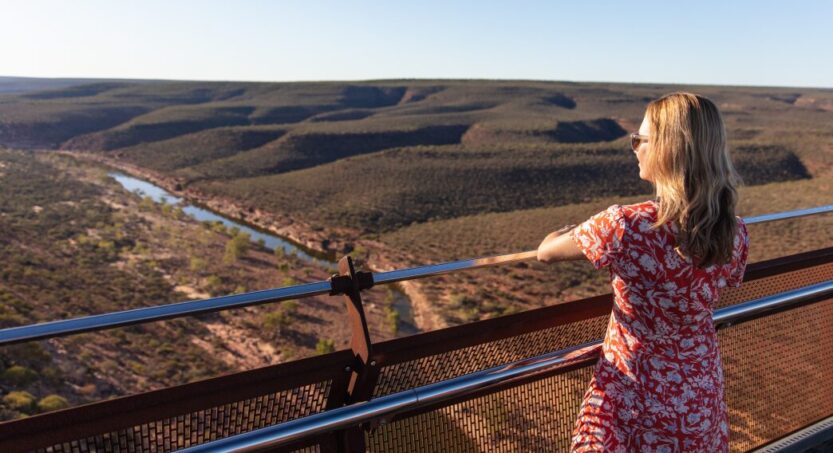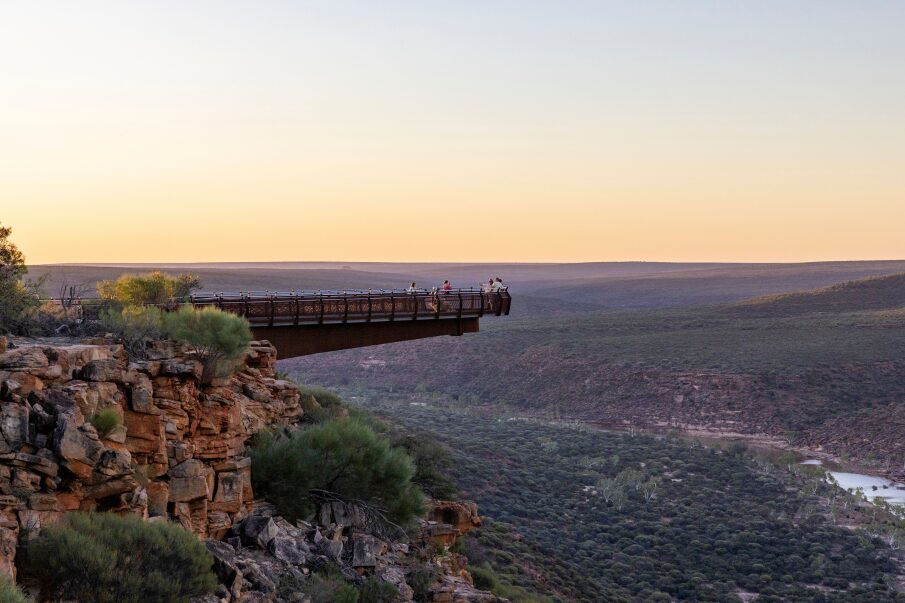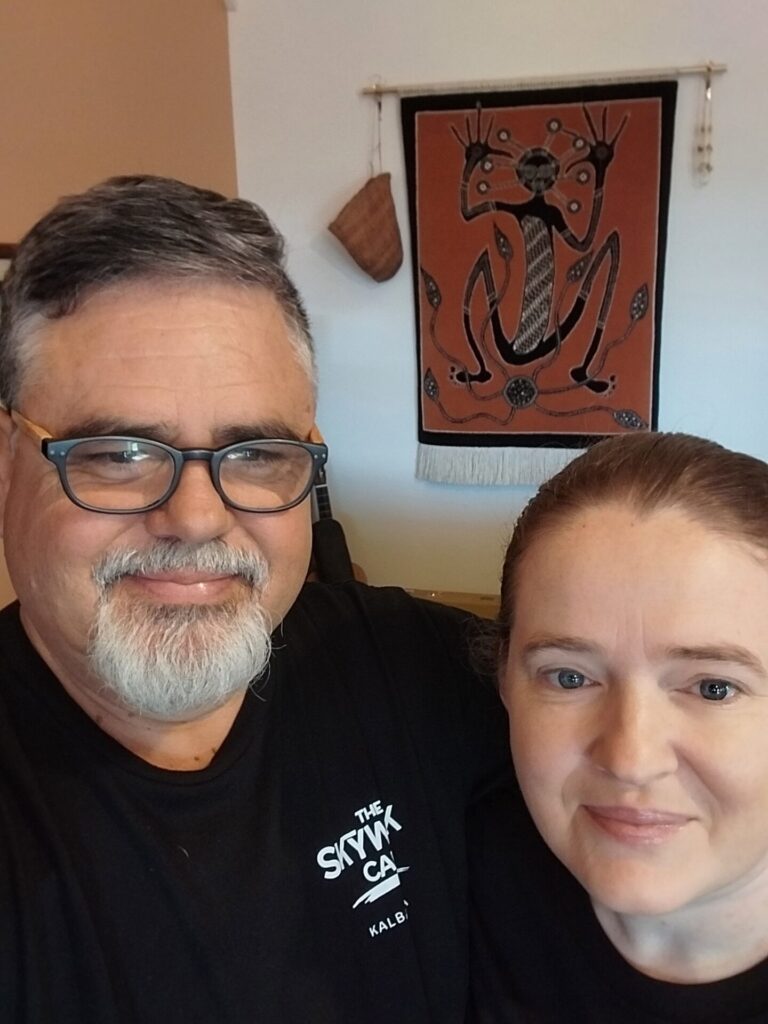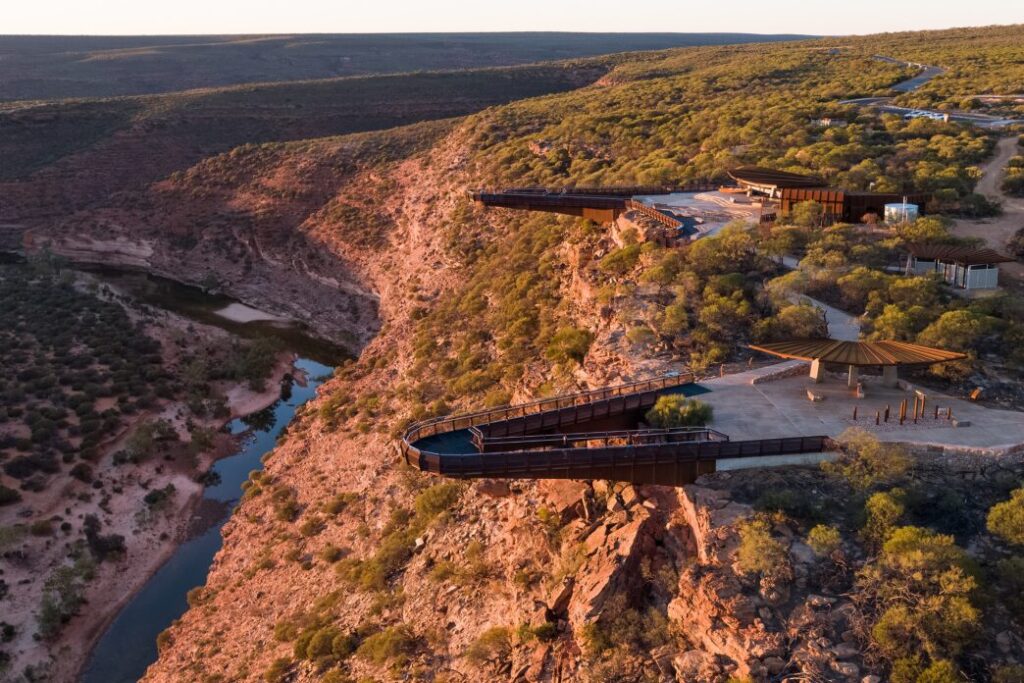Skywalk Cafe: ‘It’s such a beautiful story’

At the Skywalk Cafe overlooking the stunning Murchison Gorge in Western Australia, tourists get a serve of traditional knowledge with their coffee from its Nhanda owner, Tony Wilton. Tony was able to take on the business on the land of his ancestors with the support of Aboriginal Tourism Western Australia (ATWA), which is backed by philanthropic funders. Providing start-ups with infrastructure, training and other support is helping Indigenous businesses in remote areas of the state to thrive.
Tony remembers being a kid in Kalbarri, WA, when his mob, the Nhanda people, still camped along the river, and lived on the lands of Murchison House Station. The station was then managed by the Blood family, who respected the depth of years that the local Indigenous population had lived on the coastal land. “My family, my great grandmother and my ancestors are buried on that station,” Tony said. “That station is the traditional burial ground, and there’s a cave that has been in our family for a millennia. It’s our family cave.”
This is why Tony and his wife, Ann, moved back from Broome, so that he could reconnect with his ancestral land. But even Tony hadn’t been ready for the wave of emotion that rocked him when he visited the Skywalk tourist attraction north-east of the town – a 100-metre lookout over the Murchison Gorge. Tony was stunned to find the historical display included photos of his mother and other family members. He also noticed that the adjacent cafe was closed up and empty. With his food truck business failing, he inquired, discovered a local business was on the brink of taking it over, spoke to them about his Nhanda roots, and they willingly stepped aside so he could take over the cafe.

This is when Tony met the crew from the Western Australian Indigenous Tourism Operators Council (WAITOC), a not-for-profit organisation that helps Aboriginal tourism operators build their businesses and find success. WAITOC had recently established a DGR-registered subsidiary, ATWA, to attract philanthropic donations to offer business training, capital support – anything a start-up business like Tony’s café might need.
The CEO of ATWA and WAITOC, Rob Taylor, is also a Nhanda man, so Tony’s success is particularly close to his heart. “It’s such a beautiful story,” he said. “The Skywalk Cafe coming back into Indigenous hands and actually being able to add that entire, deep cultural aspect to what’s already a cool tourist property is fantastic. We supported them in getting infrastructure, as in, some of the things they needed to run the cafe that they wouldn’t have been able to afford, as well as training and development, supporting the creation of their website and so on.”
WAITOC created ATWA to enable new lines of funding for such a purpose. For two decades, most of WAITOC’s funding has been from government, which tends to be tied to election cycles and comes with parameters and restrictions.
Rob said the clear priority in WAITOC funding was to support Indigenous tourism ventures in the north of the state, mostly across the Kimberley. “The money we get is from royalties for regions, which means it can only be used in those regions,” he said. “So, we couldn’t support the mid-west of WA and the great southern and southwest because we didn’t have the money or the staff.”
Hence, the lateral solution to establish ATWA and build less restricted philanthropic funding. Asked if attracting donations for the new venture was a hard sell, Rob laughed. “It was like, ‘build it and they will come’, because I was in East Kimberley and I literally tripped over a lady. She was wandering around and saw me, in my uniform, and wanted to come to have a look at some of our products. She just followed us in her car while we were going around meeting some of our members.” This mysterious woman, who still asks that her donations remain anonymous, not only pledged her support, but she introduced Rob to another philanthropist partner and Lotterywest, which provided a grant.
There are two streams to ATWA’s work. A Business Support Hub, offering all the training and services they might need, and an Aboriginal Tourism Accelerator, offering mentoring for Indigenous business owners.
Aboriginal tourism adds $63.8 million to Western Australia’s income, as well as providing hundreds of jobs for Indigenous workers since WAITOC started, which Rob is hoping will double under ATWA’s philanthropic support. However, it’s about more than budget lines. “Governments want to see economic returns, but we look at the social return on investments,” he said. “We’re about social impacts like strengthening our pride in our culture, keeping our culture and language alive.”

Rob points out that 99% of Indigenous tourism companies are small or micro businesses, and that the owners have no institutional wealth, handed down over generations of family, because First Nations people could not own a business before the referendum of 1967. This flows to failing applications for home loans, and other barriers to entry in the quest for financial security and business success. ATWA’s philanthropists are making a tangible difference.
“I couldn’t be more grateful,” said Tony Wilton (pictured left with his wife Ann). “I think out of all the organisations that I’ve had anything to do with, I would rate them (WAITOC/ATWA) up there as probably the best, and I’m not just blowing smoke rings.”

Tony now owns a house with a view. “I wake up in the morning on our property, it overlooks Kalbarri and it looks out over the hills of the ancestors, and I can get up and have a coffee, walk out on to our veranda and just be there and commune. I’ve never really gotten into contact with that part of myself before or been able to share it with Ann.
“At the cafe, people want to see and hear Aboriginal people speaking the truth about their experience, so when I’m serving coffees, I get the chance to talk to people and share my insight into the Nhanda culture and explain. I put things in context for them and help them to see through different eyes. They feel like they’ve had an experience, a proper experience.
“WAITOC (through ATWA) helped make it happen. We all need a hand up, and it’s sometimes hard to hold out a hand and ask for help. I really appreciate what they’ve done.”
To learn more about the work of Aboriginal Tourism Western Australia, visit atwa.org.au and waitoc.com.